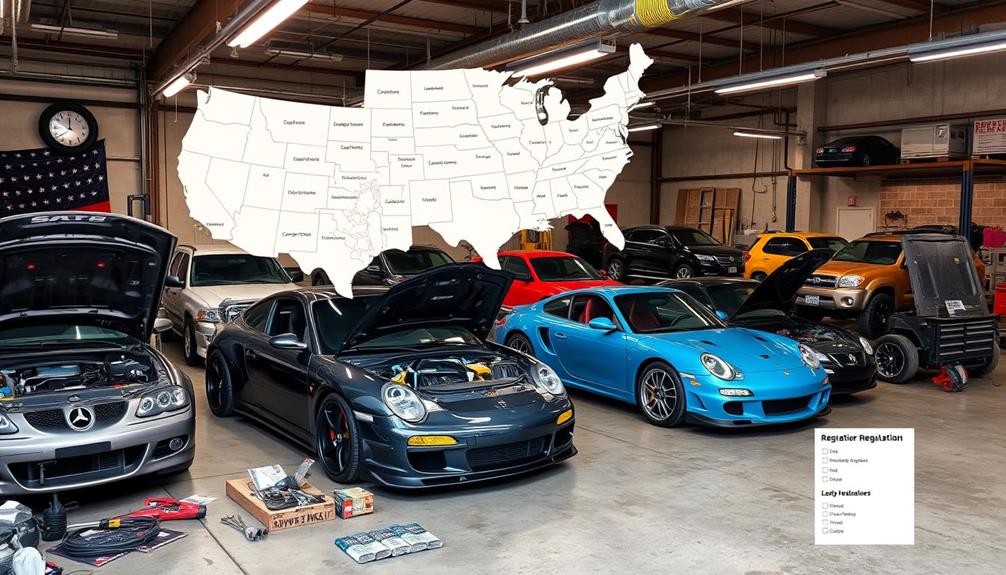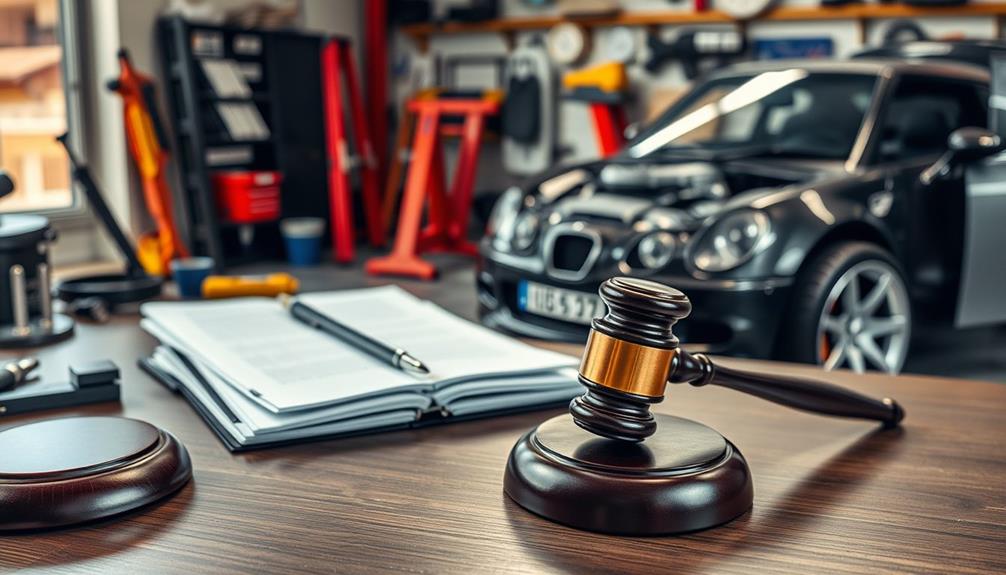Car tuning isn't outright illegal, but you need to be careful. Modifications involving emissions systems can land you in hot water due to federal laws against tampering. Each state has its own rules, with some, like California, being particularly strict. Illegal mods can lead to hefty fines or even impoundment. Common pitfalls include altering exhaust systems or removing catalytic converters. To avoid issues, always check local laws, keep your emissions systems intact, and document your modifications. Understanding the full scope of regulations can help guarantee you're on the right side of the law. There's more to uncover about compliance requirements. Car tuning regulations can be complex and vary from state to state, so it’s important to do your research and stay informed. In addition to emissions systems, other aspects of car tuning, such as engine modifications and body alterations, may also be subject to regulations. It’s crucial to ensure that your vehicle remains compliant with all relevant laws and regulations, as ignorance is not a valid defense in the eyes of the law. By staying knowledgeable about car tuning regulations, you can enjoy customizing your vehicle while avoiding any legal trouble.
Key Takeaways
- Car tuning is legal in the U.S., but modifications affecting emissions may lead to legal issues and fines.
- Each state has specific regulations regarding vehicle modifications; research local laws before proceeding.
- Tampering with emissions control systems, such as removing catalytic converters, is prohibited and can incur hefty fines.
- Ensure modifications comply with EPA guidelines to pass emissions tests and avoid penalties.
- Document all modifications and choose reputable shops to mitigate risks and ensure safety.
Understanding Car Tuning Legality
Understanding car tuning legality is important for anyone looking to modify their vehicle. While car modifications are generally legal in the U.S., you need to be cautious about certain changes, especially those affecting emissions control systems. Federal law prohibits modifications that tamper with these systems, so you'll want to think twice before making any adjustments that could lead to increased emissions.
Many states have their own regulations, which can be stricter than federal guidelines. This means it's essential to familiarize yourself with local laws before proceeding with any tuning. If you fail to comply with emissions standards, you could face legal issues and even fines.
Furthermore, if your modified vehicle doesn't pass emissions testing, it could be flagged and deemed illegal for road use.
Keep in mind that some modifications might void your manufacturer's warranty, as manufacturers often deny claims due to unauthorized alterations.
Key Regulations by State

Steering through the key regulations surrounding car tuning can feel overwhelming, but it's vital for anyone looking to modify their vehicle. Each state in the U.S. has its own rules regarding emissions standards and vehicle modifications, which can vary greatly.
For instance, California is known for its strict emissions testing requirements and doesn't allow modifications that impact emissions control systems without proper certification.
On the other hand, states like Texas offer more leeway for modifications but still enforce noise ordinances and safety inspections for modified vehicles. You'll also encounter specific restrictions on aftermarket parts in some states, such as needing a CARB Executive Order (EO) for performance enhancements like cold air intakes.
Before diving into any modifications, it's essential for you to research and understand your local state laws thoroughly. Ignoring these regulations can lead to penalties, fines, or even vehicle impoundment.
Impact of EPA Guidelines

When it comes to tuning your vehicle, understanding the EPA guidelines is vital.
These regulations clarify what modifications are legal, especially regarding emissions testing requirements. Ignoring these rules could lead to significant penalties, so it's important to stay informed about both federal and state laws.
EPA Regulation Overview
The Environmental Protection Agency (EPA) plays an essential role in regulating vehicle emissions, which directly impacts car tuning enthusiasts.
As a tuner, you need to understand that the EPA prohibits the use of aftermarket defeat devices designed to circumvent emissions control systems. While tuning itself isn't explicitly illegal, modifications affecting emissions systems—like diesel deletes or the removal of catalytic converters—are primary enforcement targets.
To stay compliant with emissions standards, your tunes must allow your vehicle to pass smog checks and be easily reverted to original equipment manufacturer (OEM) settings.
It's vital to remember that vehicles modified in violation of the Clean Air Act can face fines of up to $10,000.
The EPA's focus on emissions compliance means you'll need to stay informed about both federal and state regulations to avoid potential legal issues.
Being aware of these guidelines helps guarantee that your modifications enhance performance without stepping into illegal territory.
Tuning Legality Clarification
Maneuvering the legality of car tuning requires a clear understanding of EPA guidelines and their impact on your modifications. While many tuning modifications are legal, they must adhere to emissions standards.
The EPA's Section 203(a)(3)(B) specifically prohibits the use of aftermarket defeat devices that disable emissions control systems. This means that if you're considering modifications that greatly impact emissions, like diesel deletes or unapproved catalytic converter removals, you might be venturing into illegal territory.
To stay compliant, verify your vehicle can pass smog checks and can revert to OEM settings when needed. This way, you can enjoy your tuning enhancements without running afoul of the law.
It's also vital to remember that many states enforce stricter regulations than federal EPA guidelines. You'll want to familiarize yourself with your local laws before diving into any modifications.
Ignoring these regulations can lead to hefty fines, so understanding the legal implications of your tuning choices is important. Always prioritize compliance to enjoy the benefits of car tuning without the risk of legal issues.
Emissions Testing Requirements
Understanding emissions testing requirements is essential for anyone considering car modifications, especially since these regulations can vary considerably between states.
You'll want to verify your modifications are legal and compliant with emissions standards to avoid potential penalties.
Here are some key points to keep in mind:
- Federal law prohibits modifications that tamper with emissions control systems.
- Many states require emissions testing for modified vehicles.
- Removing or bypassing components like the catalytic converter can lead to legal issues.
- Failing emissions tests can result in fines and costly repairs.
- The EPA may impose fines up to $10,000 for non-compliance.
Before you make any changes, check your local laws and regulations.
Confirm that your modifications are legal and can easily revert back to OEM settings if needed.
By adhering to these guidelines, you can enjoy your vehicle's enhancements without risking legal trouble or financial consequences.
Common Illegal Modifications

Car enthusiasts often push the limits of their vehicles, but some modifications can land you in hot water. One of the most common illegal modifications is altering your exhaust system to exceed noise limits. Loud muffler systems can attract citations under local noise ordinances, making your ride less enjoyable.
In addition, if you remove or tamper with catalytic converters, you could face hefty fines of up to $10,000 due to federal law.
Window tinting is another area where you need to tread carefully. Overly dark window tints may violate state laws, leading to fines and even the risk of having your vehicle impounded.
Moreover, installing headlights that are too bright can lead to traffic stops, as they often fall outside federal lumen specifications.
Lastly, using police lights or colors on civilian vehicles is strictly illegal and can result in severe penalties, including heavy fines or jail time.
It's vital to know these common illegal modifications before you start tuning your car, as they can quickly turn your passion into a legal headache.
Consequences of Non-Compliance

Ignoring vehicle modification laws can lead to serious repercussions that go beyond mere fines. The consequences of non-compliance can hit you hard, both financially and legally.
Here's what you might face if you don't follow the rules:
- Significant fines that vary by state and violation type.
- Impoundment of your vehicle, leading to costly towing and storage fees.
- Traffic tickets for illegal modifications, requiring mandatory court hearings.
- Increased insurance premiums or even denied claims if your modifications violate state laws.
- Loss of driving privileges after repeated infractions, affecting your ability to drive legally.
These consequences can severely impact your finances and lifestyle.
It's vital to understand that the thrill of vehicle modifications comes with responsibilities. Compliance with modification laws not only keeps you on the right side of the law but also guarantees your vehicle remains safe and insurable.
Before you start any tuning or modifications, consider these potential legal and financial repercussions. Make informed choices to enjoy your car while avoiding the pitfalls of non-compliance.
Tips for Safe Modifications

When you're ready to modify your vehicle, prioritizing safety and legality should be at the forefront of your mind. Start by checking local and state regulations regarding vehicle modifications to verify compliance with noise, emissions standards, and safety standards. This step is vital to avoid any legal issues down the line.
Always maintain your original emissions control systems while tuning your vehicle. This helps you stay within federal laws and state-specific emissions regulations, protecting both you and the environment. Documenting all modifications and keeping receipts will also be beneficial for addressing any warranty claims or legal inquiries later.
Choose reputable shops or professionals for performance modifications. Their expertise will guarantee proper installation and adherence to safety standards, reducing the risk of hazards on the road.
After modifications, regularly inspect your vehicle to confirm all components are functioning correctly. Poorly executed modifications can lead to significant safety risks, so it's important to stay proactive.
Seeking Legal Assistance

Modifying your vehicle can come with its own set of legal challenges, so seeking legal assistance can be a smart move. Understanding your rights and responsibilities regarding vehicle modifications is vital, especially when it comes to emissions standards.
Here's why consulting a legal expert can make a difference:
- Get clarity on local laws and regulations.
- Understand the potential consequences of your modifications.
- Access free initial consultations to evaluate your situation.
- Negotiate reduced penalties or dismissals for fines.
- Empower yourself with self-help resources and legal guidance.
Legal representation can help you navigate the complexities of vehicle modifications. If you face citations for illegal modifications or emissions violations, an attorney can provide insights and support.
Many offer free consultations to discuss your case and explore the best course of action. With their expertise, you can better understand local laws, guaranteeing compliance and reducing legal risks.
Don't underestimate the importance of legal advice when modifying your vehicle. It can save you from costly fines and guarantee your car meets the necessary emissions standards.
Taking proactive steps now can lead to a smoother driving experience down the road.
Frequently Asked Questions
Is It Illegal to Mod Your Car?
Modding your car isn't inherently illegal, but it depends on what changes you make. Always check local laws and regulations, especially concerning emissions, to avoid fines or complications with your vehicle's warranty. Stay informed!
Are ECU Tuning Legal?
ECU tuning's generally legal in the U.S., but you need to watch for emissions regulations. Make sure your modifications comply with both federal and state laws to avoid potential fines or warranty issues.
Is Tuning a Car a Modification?
Tuning's truly a transformative tweak! When you modify your car's engine control settings, you're enhancing performance. Just remember, while tuning can be thrilling, it's vital to reflect on potential consequences and compliance with regulations.
Can I Modify My Car in Texas?
Yes, you can modify your car in Texas, but make sure you follow state laws regarding emissions, safety, and sound. Remember to check specific regulations for your vehicle type and any necessary inspections after modifications.
Conclusion
To sum up, tuning your car can be thrilling, but you've got to stay informed. Avoiding illegal modifications isn't just about following the rules; it's about keeping your ride—and your wallet—safe. Remember, you wouldn't want your ride to become a "lemon" because of a simple oversight. So, do your homework, follow the regulations, and enjoy the journey of personalizing your vehicle responsibly. Your dream car shouldn't come with a hefty price tag in fines!









